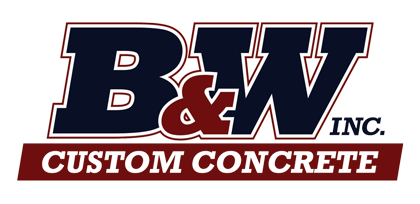B & W Custom Concrete Weighs In
Winter’s here. We all shovel our walks and driveways and then pour a deicer to protect ourselves and our guests from falling on ice or snow. But, is this the best solution?
These deicing salts are damaging your concrete. They are made from chemicals that can rapidly disintegrate the surface. Deicers are especially hard on new concrete because being freshly-poured, it’s very fragile the first year. It needs time to settle, cure, and strengthen. Although some deicers claim to be safe for the surface of concrete and are a great solution to melt the ice, they could be compromising the durability of the surface over time, especially on new concrete.
As winter temperatures fluctuate, concrete absorbs the water. As it freezes it expands, resulting in cracks and other issues. By using a potassium chloride deicer, your concrete freezes and thaws more rapidly. It does this unnaturally, resulting in damage in the years that follow. After years of this, the concrete can no longer handle the pressure that has built up as a result of the constant quick freeze/thaw cycle. The outcome is a displeasing look aesthetically as it exposes the aggregate making the concrete weaker.
There are ways to keep you and your guests safe from falling while still enjoying strength, durability and beauty of your concrete.
Proper Curing
Curing should be done immediately after texturing is finished. Calcium chloride can be used to speed up the curing process by as much as two-thirds. Concrete sealers are then used to coat the surface. By using a concrete sealer, it will help to waterproof the surface and in turn, prevent water and other harmful substance penetration.
Don’t Use Deicing Chemicals for the First Year
You can substitute deicers the first year with sand to provide traction. It has been found that sand is the only material that provides safety while not damaging your concrete surface.
Keep Fertilizers Off Concrete
Fertilizers often contain two chemicals that aid in the disintegration of concrete - ammonium nitrate and ammonium sulfate. Try to keep these away from your concrete, especially during its first year.
Use Table Salt After the First Winter
Sodium chloride (also known as table salt) won’t corrode the surface and can be used after the first year.
Winter can really take a toll on your concrete surfaces. Talk with one of B & W Custom Concrete experts about deicing and protection to be sure your curb appeal lasts for many years to come.
Next month we will talk about concrete popouts as they are another cause for the erosion of new concrete. The compromised aggregate absorbs moisture. When the moisture freezes and expands, it creates a pressure internally thereby rupturing it. Visit our blog next month to learn more about it.

